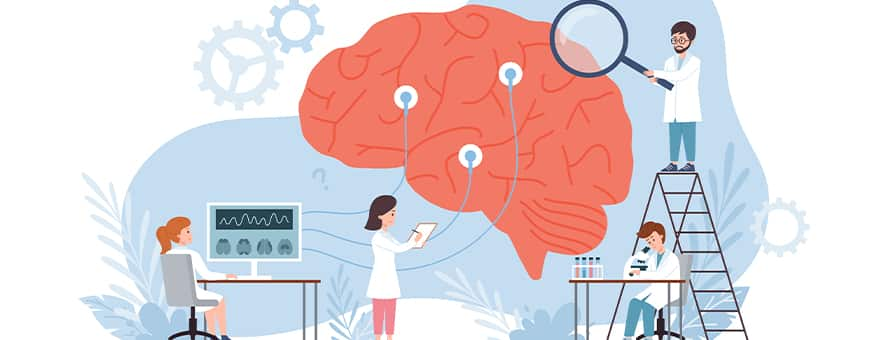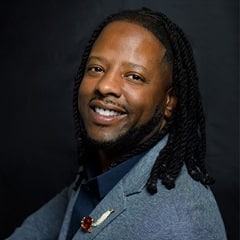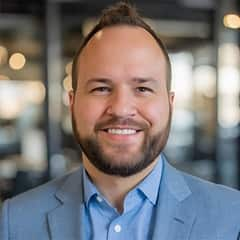Empowering Future Healthcare Leaders at SNHU Thought Leaders Conference

The healthcare industry is undergoing a profound transformation. Advances in technology, integration of artificial intelligence, shifts in policy and a growing demand for equity in care are redefining what healthcare means.
At Southern New Hampshire University (SNHU), faculty members across nursing, public health and healthcare administration programs are preparing the next generation of healthcare leaders, including a focus on continual education via the 8th annual Thought Leaders Conference. The virtual conference sessions featured speakers who shared their insights on how education, leadership and innovative approaches are shaping the future of healthcare.
Sponsored by Elliot Health System, a provider of comprehensive healthcare services in southern New Hampshire, the Thought Leaders Conference was free for anyone to attend.
The theme of this year’s conference, "Empowering Health: Approaches for a Changing World," looked at the challenges and changes facing the field, as well as how professionals in the space can have an impact.
Attendees had the chance to learn more about innovative strategies, emerging technologies and advocacy efforts shaping healthcare. And with the importance of maintaining licensure, attendees also had the opportunity to earn up to 7.5 contact hours for attending both days.
Challenges Facing Healthcare Today

As healthcare organizations face rising pressure on multiple fronts, staffing remains a primary focus. "One of the most significant challenges facing the healthcare industry is workforce burnout and shortages, particularly among nurses and public health professionals, which affects care delivery and population health outcomes," said Dr. Brandon Ryans, an associate dean of health professions at SNHU.
Dr. Lyndsay Goss, a director of continuing professional development and nursing faculty member at SNHU, echoed this concern. "Staffing gaps continue to strain healthcare teams, making recruitment, retention and professional development more important than ever," she said.
In addition to labor shortages, Dr. Pam Varhol, a senior associate dean of health professions at SNHU, noted that rising costs and cybersecurity threats are additional obstacles in healthcare today.
Conference speakers, such as SNHU nursing and health professions adjunct Dr. Dustin McLemore, highlighted how these issues — and more — are impacting care delivery.
"Healthcare organizations are having to manage more complex clinical conditions, especially in aging patient populations and those struggling with persistent equity and access barriers," said McLemore. "This is in the face of declining payor reimbursements and organizational challenges maintaining workforce readiness."
Despite these hurdles, there are opportunities for innovation and growth.
According to Ryans, there is a growing need for strategic leadership among health administrators to:
- Improve system efficiency
- Integrate digital health technologies
- Support value-based care
Attending professional development opportunities such as the annual Thought Leaders Conference is important to the field's future, according to Goss. "We can reimagine how we support the healthcare workforce through education, technology integration and inclusive practices," she said.
The Impact of Technology
Technology is a major driver of change across the healthcare industry, with many opportunities and challenges expected. "I’m particularly excited about the integration of artificial intelligence (AI) in healthcare, which is enhancing diagnostics, personalizing treatment plans and improving administrative efficiency," Ryans said.
And this is just the beginning. Ryans can see a future in which AI and machine learning will be embedded in decision-making diagnostics and predictive analytics. Plus, telehealth options can make way for personalized care that's both accessible and efficient, according to Ryans, which can really make a difference among rural and underserved populations.

The use of AI, data analytics and digital health solutions in healthcare are also leading to faster diagnoses and more efficient operations, according to Varhol. "Innovations such as electronic health record (EHR) systems have revolutionized data tracking, allowing for more accurate and efficient management of patient information," she said.
During the conference, panelist Ben Tasker, adjunct faculty and former associate dean of AI and data sciences at SNHU, shared a forward-looking perspective on AI. "The opportunities lie in scaling innovations like AI for clinical decision support, administrative automation and patient engagement — but only if implemented ethically and with intent," he said.
But technology alone won't solve existing issues. "Without intentional frameworks, AI will not fix what is broken — it will amplify it," he said.
Addressing Health Equity
Ensuring health equity was a critical focus of the conference. "Health equity remains a concern, as disparities in care access and outcomes persist across underserved populations," Goss said.
One way to address these disparities is through policy and practices that expand access to quality care, according to Ryans. These policies can address social determinants directly tied to healthcare outcomes, he said, including:

- Education
- Food security
- Housing
- Income
- Location
Communication and training are increasingly important in the field, too. "Within a healthcare organization, policies serve as essential guidelines for ensuring effective communication and patient comprehension," Varhol said.
That means employee training on these policies and practices is crucial. "(Training) equips staff with the knowledge and skills necessary to uphold communication standards, foster patient-centered care and enhance overall healthcare outcomes," she said.
The Future of Healthcare

The SNHU healthcare leaders offered bold — and hopeful — visions for the future of the field.
"I envision a healthcare system that is equitable, person-centered and collaborative," Goss said. "Where prevention and social determinants of health are integrated into care — with a well-supported healthcare workforce empowered to lead meaningful change."
Varhol has a global vision for the future, in which healthcare organizations work together and share knowledge on:
- Advanced processes
- Groundbreaking treatments
- Innovative technologies
- Preventive strategies
McLemore described a human-centered future built on trauma-informed care principles where technology will enhance instead of replace human connection.
Tasker reinforced that view.
"It will be about human and machine, working together to deliver care that is not only more efficient, but more ‘humAIne’ care that sees the patient as a whole person — not just a diagnosis or a data point," he said.
Guiding Future Leaders
The speakers also offered advice for aspiring healthcare professionals.
"Lead with empathy, curiosity and honesty while staying grounded in your purpose," Goss said.
It's important for leaders to be compassionate, too, according to McLemore, removing pain points their teams face so they can focus on what they do best.
Ryans encouraged future leaders to work on their communication and collaboration skills — and to keep a patient-first perspective. "Embrace technology and innovation, but always keep the patient experience and care at the heart of decision-making," he said.
Consider joining a professional association, too. "(It) can provide valuable networking opportunities, mentorship and industry insights," Varhol said.
Tasker urged leaders to invest in their future skills. "Start thinking about your AI upskilling and reskilling plan today," he said. "Document it."
Lessons Learned at the Conference

For speaker McLemore, the 2025 Thought Leaders Conference was a reminder of the importance of continuous education. "Even with two decades of experience as a practitioner, I find myself constantly learning," he said. "Preparing content for new and innovative topics enabled me not only to share my own journey but also to highlight the role of clinicians and caregivers in direct patient care as the driving force behind change."
As healthcare continues to adapt to an increasingly complex environment, the insights shared at the Thought Leaders Conference offered a roadmap for evolving the healthcare system to one that is equitable, innovative and deeply human-centered, further empowering health for all.
"The 2025 Thought Leaders Conference was a platform where conversations transcended hype and focused on meaningful innovation," Tasker said. "The energy was not just aspirational — it was actionable."
Interested in seeing what you missed during the conference? Check out the on-demand session recordings.
Discover more about SNHU’s healthcare degrees: Find out what courses you'll take, skills you’ll learn and how to request information about the program.
Steven White is a copywriter and general education instructor at Southern New Hampshire University (SNHU). He earned his bachelor’s in English at West Virginia Wesleyan College and a master’s in higher education and student affairs from Virginia Tech. Then, he spent the next few years working in student support resources, ranging from career advising to international student services. Having enjoyed the branding and creative elements of his work, he transitioned to the field of marketing full-time at SNHU.
In his free time, White enjoys writing fiction, exploring the Appalachian Mountains he calls home and being a cat dad. Connect with him on LinkedIn.
Explore more content like this article

SNHU Joins Sigma, Global Nursing Honor Society

Academic Spotlight: Dr. Ashley Love, Program Director of Public Health Programs

What is Population Health Management?
About Southern New Hampshire University

SNHU is a nonprofit, accredited university with a mission to make high-quality education more accessible and affordable for everyone.
Founded in 1932, and online since 1995, we’ve helped countless students reach their goals with flexible, career-focused programs. Our 300-acre campus in Manchester, NH is home to over 3,000 students, and we serve over 135,000 students online. Visit our about SNHU page to learn more about our mission, accreditations, leadership team, national recognitions and awards.


